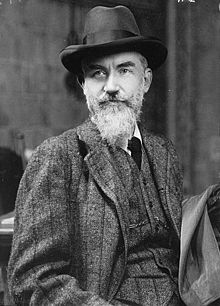Jacques Barzun
Appearance


Jacques Barzun (November 30, 1907 – October 25, 2012) was a French-born American scholar, historian, critic, teacher and editor.
Quotes
[edit]

- Among the words that can be all things to all men, the word "race" has a fair claim to being the most common, most ambiguous and most explosive. No one today would deny that it is one of the great catchwords about which ink and blood are spilled in reckless quantities. Yet no agreement seems to exist about what race means.
- Race: A Study in Modern Superstition (1937)
- In seventeenth- and eighteenth-century France, race was already a weapon in the struggle between absolutism, aristocracy, and the middle class. The warfare spread to the arts and philosophy in the nineteenth century, by which time independent shoots in other cultures had also borne fruit, leaving the grand harvesting on a world-wide scale to our generation.
Viewed in the light of such facts, the race question appears a much bigger affair than a trumped-up excuse for local persecution. It becomes rather a mode of thought endemic in Western civilization. It defaces every type of mental activity — history, art, politics, science and social reform.- Race: A Study in Modern Superstition (1937)
- Teaching is not a lost art, but the regard for it is a lost tradition.
- Teacher in America (1945)
- If they leave college thinking, as they usually do, that science offers a full, accurate, and literal description of man and Nature; if they think scientific research by itself yields final answers to social problems; if they think scientists are the only honest, patient, and careful workers in the world; if they think that Copernicus, Galileo, Newton, Lavoisier, and Faraday were unimaginative plodders like their own instructors; if they think theories spring from facts and that scientific authority at any time is infallible; if they think that the ability to write down symbols and read manometers is fair grounds for superiority and pride, and if they think that science steadily and automatically makes for a better world — then they have wasted their time in the science lecture room; they live in an Ivory Laboratory more isolated than the poet's tower, and they are a plain menace to the society they belong to. They are a menace whether they believe all this by virtue of being engaged in scientific work themselves or of being disqualified from it by felt or fancied incapacity.
- On students, in Teacher in America (1945)

- A student under my care owes his first allegiance to himself and not to my specialty; and must not be burdened with my work as if he followed no other and had contracted no obligation under heaven but that of satisfying my requirements.
- "A Loyalty Oath for Scholars," The American Scholar (Summer 1951)
- Whoever wants to know the heart and mind of America had better learn baseball, the rules and realities of the game — and do it by watching first some high school or small-town teams.
- God's Country and Mine (1954)
- Many of us affect a tone of irony about gadgets, as if we lived always in realms above and dealt with trifles only during rare descents from sublime thoughts. The truth is that more and more of the important things in life turn on pinpoints. Our frustrations begin in trivialities — a telephone out of order, a car that will not start, a claim check whose number has been misread. The thing in cellophane that cannot be got at — plain to the sight but sealed like an egg — is the modern version of the torture of Tantalus. Catastrophes we will deal with like heroes, but the bottle top that defies us saps our morale, like the tiny arrows of the Lilliputians that maddened Gulliver and set his strength at naught.
- God's Country and Mine (1954)

- The greatest artists have never been men of taste. By never sophisticating their instincts they have never lost the awareness of the great simplicities, which they relish both from appetite and from the challenge these offer to skill in competition with popular art.
- The Energies of Art: Studies of Authors Classic and Modern (1956)
- The one thing that unifies men in a given age is not their individual philosophies but the dominant problem that these philosophies are designed to solve.
- Classic, Romantic, Modern (1961), ch. I: "Romanticism — Dead or Alive?"
- We are accustomed to the artist scoundrel or specialist in vice, and unaccustomed to the creator in whom passion and reason and moral integrity hold in balance. But greatness of intellect and feeling, or soul and conduct — magnanimity, in short — does occur; it is not a myth for boy scouts, and its reality is important, if only to give us the true range of the term "human," which we so regularly define by its lower reaches.
- Preface to the 3rd edition of Berlioz and the Romantic Century (1969)

- History, like a vast river, propels logs, vegetation, rafts, and debris; it is full of live and dead things, some destined for resurrection; it mingles many waters and holds in solution invisible substances stolen from distant soils. Anything may become part of it; that is why it can be an image of the continuity of mankind. And it is also why some of its freight turns up again in the social sciences: they were constructed out of the contents of history in the same way as houses in medieval Rome were made out of stones taken from the Coliseum. But the special sciences based on sorted facts cannot be mistaken for rivers flowing in time and full of persons and events. They are systems fashioned with concepts, numbers, and abstract relations. For history, the reward of eluding method is to escape abstraction.
- "History as Counter-Method and Anti-Abstraction," Clio and the Doctors (1974)

- When plugged in, the least elaborate computer can be relied on to work to the fullest extent of its capacity. The greatest mind cannot be relied on for the simplest thing; its variability is its superiority.
- "The Masterpiece," in A Stroll with William James (1983)
- My notion about any artist is that we honor him best by reading him, by playing his music, by seeing his plays or by looking at his pictures. We don't need to fall all over ourselves with adjectives and epithets. Let's play him more.
- The truth is, when all is said and done, one does not teach a subject, one teaches a student how to learn it.
- "Reasons to De-Test the Schools," New York Times (1988-10-11), later published in Begin Here: The Forgotten Conditions of Teaching and Learning (1991)

- The need for a body of common knowledge and common reference does not disappear when a society is pluralistic. On the contrary, it grows more necessary, so that people of different origins and occupation may quickly find familiar ground and as we say, speak a common language. It not only saves time and embarrassment, but it also ensures a kind of mutual confidence and goodwill. One is not addressing an alien, as blank as a stone wall, but a responsive creature whose mind is filled with the same images, memories, and vocabulary as oneself. Otherwise, with the unstoppable march of specialization, the individual mind is doomed to solitude and the individual heart to drying up.
- "Of What Use the Classics Today?," Begin Here: The Forgotten Conditions of Teaching and Learning (1991)

- Everybody keeps calling for Excellence — excellence not just in schooling, throughout society. But as soon as somebody or something stands out as Excellent, the other shout goes up: "Elitism!" And whatever produced that thing, whoever praises that result, is promptly put down. "Standing out" is undemocratic.
- "Schooling No Mystery," Begin Here: The Forgotten Conditions of Teaching and Learning (1991)
- He sent me a letter from India, where I think he got a fellowship to spend a year or so. He sent me a letter that read, I've just met a wonderful guru who can read minds. "I want you to" — Allen had a way of saying "I want you to do this, I want you to do that" — "I want you to get him a position in the Philosophy Department." I wrote back, "Dear Allen, the members of the Philosophy Department want nothing so little as to have their minds read."
- On Allen Ginsberg, in "The Man Who Knew Too Much: Jacques Barzun, Idea Man", interview with Roger Gathman, The Austin Chronicle (2000-10-13)
- Bernard Shaw remains the only model we have of what the citizen of a democracy should be: an informed participant in all things we deem important to the society and the individual.
- "Bernard Shaw," in A Jacques Barzun Reader : Selections from his works (2002), p. 231
- I have always been — I think any student of history almost inevitably is — a cheerful pessimist.
- Quoted in "Jacques Barzun '27: Columbia Avatar" by Thomas Vinciguerra, Columbia Today (January 2006)
- Old age is like learning a new profession. And not one of your own choosing.
- "Age of Reason" by Arthur Krystal, The New Yorker (2007-10-22), p. 103
Bernard Shaw in Twilight (1943)
[edit]- First published in The Kenyon Review (Summer 1943)

- Strangers who have seen Shaw face to face are wont to report their surprise at his gentleness and consideration, his willingness to listen and his complete lack of pose.
- II

- Shaw knows at any moment, on any subject, what he thinks, what you will think, what others have thought, what all this thinking entails; and he takes the most elaborate pains to bring these thoughts to light in a form which is by turns abstract and familiar, conciliatory and aggressive, obvious and inferential, comic and puzzling. In a word, Shaw is perhaps the most consciously conscious mind that has ever thought — certainly the most conscious since Rousseau; which may be why both of them often create the same impression of insincerity amounting to charlatanism.
Yet it is by excess of honesty that Shaw himself lent color to his representation as an inconsequential buffoon bent on monopolizing the spotlight.- II
- Shaw does not merely decorate a proposition, but makes his way from point to point through new and difficult territory.
This explains why Shaw must either be taken whole or left alone. He must be disassembled and put together again with nothing left out, under pain of incomprehension; for his politics, his art, and his religion — to say nothing of the shape of his sentences — are unique expressions of this enormously enlarged and yet concentrated consciousness.- II
- Like Rousseau, whom he resembles even more than he resembles Voltaire, Shaw never gave a social form to his assertiveness, never desired to arrive and to assimilate himself, or wield authority as of right.
- II
- Seeing clearly within himself and always able to dodge around the ends of any position, including his own, Shaw assumed from the start the dual role of prophet and gadfly. To his contemporaries it appeared frivolous and contradictory to perform as both superman and socialist, sceptic and believer, legalist and heretic, high-brow and mob-orator. But feeling the duty to teach as well as to mirror mankind, Shaw did not accept himself as a contradictory being.
- II
- Shaw's emotional development was one with his intellectual strength. His path led him into the thick of the scrimmage, where more spontaneous natures defend themselves with the usual weapons of malice, humility, bad temper or conceit. But Shaw used the death ray of imperturbability. His feelings were never hurt, his envy never aroused, his conceit was a transparent fiction, he never quarreled.
- II
- No one has ever used historical examples, near or remote, with the detail, precision, and directness to be found in every page of Shaw.
- IV

- Like Nietzsche, he rails at romanticism, but it is evident that what they both mean by the word is the clichés of second-hand romance. Historic romanticism is in fact the ground-work of their philosophy.
- IV
- He never invested his whole moral capital in a man, a book, or a cause, but treasured up wisdom wherever it could be picked up, always with scrupulous acknowledgment … His eclecticism saving him from the cycle of hope-disillusion-despair, his highest effectiveness was as a skirmisher in the daily battle for light and justice, as a critic of new doctrine and a refurbisher of old, as a voice of warning and encouragement. That his action has not been in vain, we can measure by how little Shaw's iconoclasm stirs our blood; we no longer remember what he destroyed that was blocking our view.
- IV
- For Shaw as for Goethe, the obligation to strive is a primary feeling: reason initiates nothing and would stop everything. Its use is to come after the fact and devise helpful justification of action. Culture, humaneness, spiritual grace, are not forced upon us by logic: they either are self-evident or pointless. There is, Shaw reminds us, no argument in behalf of moral conduct which would not equally well support immoral. But it is clearly impossible (and immoral) to exact moral conduct, cultivation, and grace from those whom circumstances force to lead sub-human lives. Therefore society must be reformed.
- IV
- On the one hand, society needs a common faith and vigorous institutions with the power to coerce; and on the other, the individual as a human soul or as the bearer of a new and possibly saving heresy, must be free. It is difficult enough to reconcile these two needs, but the problem holds another hazard: the need of action under the pressure of time.
- IV
The Culture We Deserve (1989)
[edit]- [Wesleyan University Press, ISBN 0-8195-6237-8]


- Philosophers no longer write for the intelligent, only for their fellow professionals. The few thousand academic philosophers in the world do not stint themselves: they maintain more than seventy learned journals. But in the handful that cover more than one subdivision of philosophy, any given philosopher can hardly follow more than one or two articles in each issue. This hermetic condition is attributed to "technical problems" in the subject. Since William James, Russell, and Whitehead, philosophy, like history, has been confiscated by scholarship and locked away from the contamination of general use.
- "Culture High and Dry" (1984), p. 9

- Scholarship has yielded to the irresistible pull that science exerts on our minds by its self-confidence and the promise of certified knowledge. But, to repeat, the objects of culture are not analyzable, not graspable by the geometric mind. Great works of art are great by virtue of being syntheses of the world; they qualify as art by fusing form and contents into an indivisible whole; what they offer is not "discourse about," nor a cipher to be decoded, but a prolonged incitement to finesse. So it is paradoxical that our way of introducing young minds to such works should be the way of scholarship.
- "Culture High and Dry" (1984), p. 14
- Criticism will need an injection of humility — that is, a recognition of its role as ancillary to the arts, needed only occasionally in a temporary capacity. Since the critic exists only for introducing and explaining, he must be readily intelligible; he has no special vocabulary: criticism is in no way a science or a system.
- "Culture High and Dry" (1984), p. 20
- We seem to live mainly in order to see how we live, and this habit brings on what might be called the externalizing of knowledge; with every new manual there is less need for its internal, visceral presence. The owner or user feels confident that he possesses its contents — there they are, in handy form on the handy shelf. And with their imminent transfer to a computer, that sense of possession will presumably attach itself to the hard disk or the phone number of the data bank.
To say this is also to say that the age of ready reference is one in which knowledge inevitably declines into information. The master of so much packaged stuff has less need to grasp context or meaning than his forbears: he can always look it up. His active memory is otherwise engaged anyway, full of the arbitrary names, initials, and code figures essential to carrying on daily life. He can be vague about the rest: he can always check it out.- "Look It Up! Check It Out!" (1986), p. 39
- On reflection, moral judgment in the arts appears rather as a tribute to their power to influence emotion and possibly conduct. And reflecting further on what some critics do today, one sees that a good many have merely shifted the ground of their moralism, transferring their impulse of righteousness to politics and social issues.
- "What Critics Are Good For" (1988), p. 69
- Can an idea — a notion as abstract as Relativism — produce by itself the effects alleged? cause all the harm, destroy all the lives and reputations? I am as far as anyone can be from denying the power of ideas in history, but the suggestion that a philosophy (as Relativism is often called) has perverted millions and debased daily life is on the face of it absurd. No idea working alone has ever demoralized society, and there have been plenty of ideas simpler and more exciting than Relativism.
- "The Bugbear of Relativism," p. 89
- The ever-present impulse is to push against restriction and, in so doing, to feel intolerably hemmed in. Thus in practice, every liberation increases the sense of oppression. Nor is the paradox merely in the mind: the laws enacted to secure the rights of every person and group, by creating protective boundaries, create new barriers.
- "The Bugbear of Relativism," p. 97

- Being law-abiding means filing a paper on time, not parking near a hydrant, and getting a zoning variance before moving a fence on one's own property. A world continually tighter in these ways intensifies the search for loopholes, tempts the unscrupulous to invent them, hardens the cynic, and keeps alive the urge to break loose. Such pulses of thought and feeling are bound to take away the ease and pleasure of ethical conduct. Habitual morality is baffled by the stop-and-go, and people's disregard of injunctions causes no surprise; it seems rather to show firmness of mind.
- "The Bugbear of Relativism," p. 98
- A person is not a democrat thanks to his ignorance of literature and the arts, nor an elitist because he or she has cultivated them. The possession of knowledge makes for unjust power over others only if used for that very purpose: a physician or lawyer or clergyman can exploit or humiliate others, or he can be a humanitarian and a benefactor. In any case, it is absurd to conjure up behind anybody who exploits his educated status the existence of an "elite" scheming to oppress the rest of us.
- "Exeunt the Humanities" (1980), p. 117
- The danger is that we shall become a nation of pedants. I use the word literally and democratically to refer to the millions of people who are moved by a certain kind of passion in their pastimes as well as in their vocations. In both parts of their lives this passion comes out in shoptalk. I have in mind both the bird watchers and nature lovers: the young people who collect records and follow the lives of pop singers and movie stars; I mean the sort of knowledge possessed by “buffs” and “fans” of all species—the baseball addicts and opera goers, the devotees of railroad trains and the collectors of objects, from first editions to netsuke.
They are pedants not just because they know and recite an enormous quantity of facts—if a school required them to learn as much they would scream against tyranny. It is not the extent of their information that appalls; it is the absence of any reflection upon it, any sense of relation between it and them and the world. Nothing is brought in from outside for contrast or comparison; no perspective is gained from the top of their monstrous factual pile; no generalities emerge to lighten the sameness of their endeavor.- p. 118
- The eager or dutiful persons who subject themselves to these tidal waves of the classics and the moderns find everything wonderful in an absent-minded way. The wonder washes over them rather than into them, and one of its effects is to make anything shocking or odd suddenly interesting enough to gain a month's celebrity. And so another by-product of our come-one, come-all policy is the tendency to reward cleverness, not art, and to put one more hurdle in the path of the truly original artist.
- "A Surfeit of Fine Art" (1986), p. 127
- The only political ism surviving in full strength from the past is nationalism. This was partly to be expected from the liberation of so many colonies simultaneously, beginning in the 1920s. But this nationalism differs from the old in two remarkable ways: it is not patriotic and it does not want to absorb and assimilate. On the contrary, it wants to shrink and secede, to limit its control to its one small group of like-minded-we-ourselves-alone. It is in that sense racist, particularist, sectarian, minority-inspired.
- "Towards the Twenty-First Century" (1972), p. 169
External links
[edit]- Barzun 100: Celebrating Jacques Barzun's 100th Year, blog with links
- The Jacques Barzun Centennial, website with tributes to Barzun
- Jacques Barzun, website with essays about Barzun
Categories:
- People from Paris
- Immigrants to the United States
- Academics from the United States
- Philosophers from the United States
- Historians from the United States
- Educators from the United States
- Editors from the United States
- Authors from the United States
- Critics from the United States
- 1907 births
- 2012 deaths
- Centenarians
- Presidential Medal of Freedom recipients
- University of Cambridge faculty
- Fellows of the Royal Society of Literature
- Members of the American Philosophical Society
- Edgar Award winners

